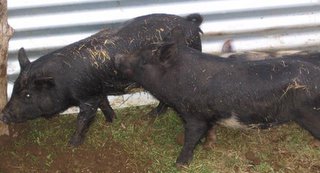
Pua'a - pig - is an institution in Samoa. Spend any time here and you will inevitably encounter, in one form or another, plenty of them. It is a far cry from Australia, where we typically only see pigs at the butchers or supermarket. Since my arrival three months ago, I have learnt the following about pua’a:
1. Pua'a are valuable
Never underestimate the importance of a pig. They provide hours of fun for the family and, assuming your sow gets stitched up on a regular basis, represent an almost endless supply of food. When required to donate something for a fa’alavelave - a major event such as a funeral or wedding - handing over a pig or two can go a long way. And it's cheaper than the financial alternative.
2. Pua'a are everywhere
Since they are so valuable, everyone owns pua’a. Lots of them. They're everywhere. Sows and their litter can be seen wandering through villages, relaxing by family graves and regularly trotting along and across the road. You always need to keep an eye out when driving.
3. "That's not a speed hump you just drove over!”
Eventually you're going to run over a pig. A split second before it happens you feel like a pig shooter in outback Australia, running down wild boar caught in your spotlights, but that feeling evaporates the moment you watch it disappear from view only to feel a couple of large thumps as your car drives over it.Running over a pig isn't really considered kosher (but then neither is pig) so it's advisable to do one of two things: keep on driving and pretend it never happened, or (if you're seen hitting the pig) offer adequate financial compensation to the owner. Occasionally a third option opens itself up to the savvy driver, which can be summed up as...
4. Never look a gift pig in the mouth
Typically, as a palagi living in Samoa, you’re only going to be offered pig as part of a meal. Should you bring an early end to a pig’s life though, you might not want to pass up the opportunity of a free feed. See point six below. Should you actually be lucky enough to be given a live pig, well then you have options open to you.
5. "Greasing the pig"
I mentioned above that pigs provide hours of fun and I wasn't lying. At the recent "Puaa Fest" I was pleased to discover that, at least in Samoa, the phrase "Greasing the pig" isn't just a euphemism. Sure, it's something that young boys primarily engage in, but the girls get into it too. Maybe it could catch on abroad, as it's very simple to arrange:
- Use some spare tin roofing or similar to build an enclosure (4m x 10m should do).
- Stick a couple of your smaller pigs in the enclosure.
- Grease your pigs - two or three sets of hands are really required for this step as you want to make sure the whole pig is slippery with grease.
- Watch the smiles on the kids' faces as they attempt to catch, barehanded, your greased pigs. Delight in the sounds of pure animal fear as the pigs attempt to evade capture.
6. Cooking and eating your pua'a
The best option for enjoying your pig is, without doubt, to eat it. The idea is to stuff it full of hot rocks wrapped in mango and breadfruit leaves, make it the centrepiece of your umu oven and enjoy it about an hour or so later. When preparing your pig, it is always important to place one hot rock in the throat, one in the stomach, and another someplace you usually hear John Elliot talk about to make sure that the meat is cooked through. Serve with umu-cooked taro and palusami for a fantastic meal.
It's what I'm doing for Christmas.